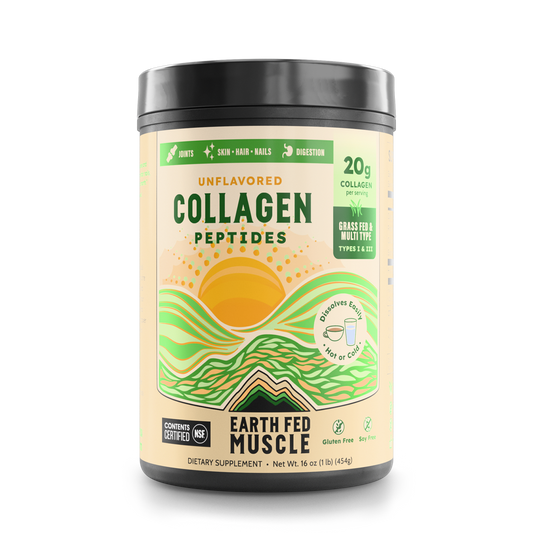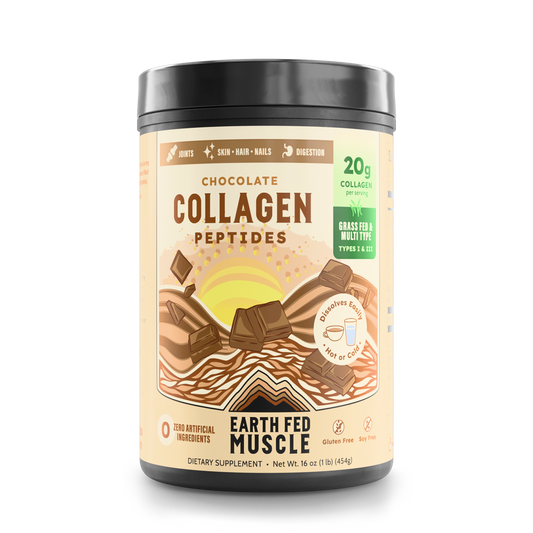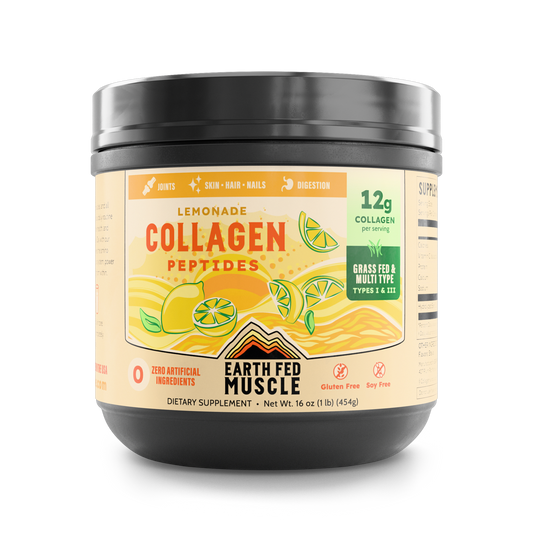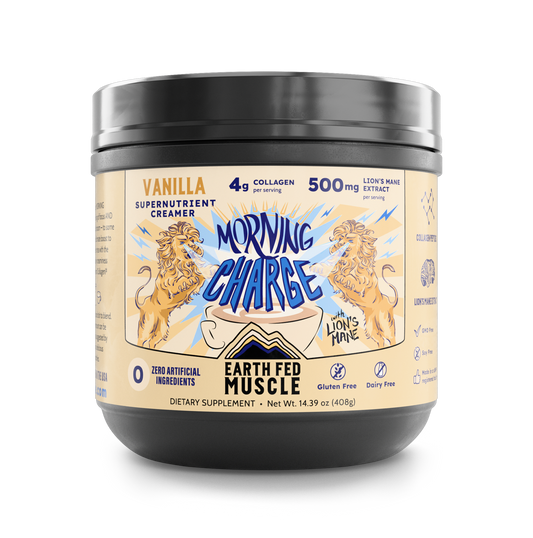There are countless articles and studies out there on collagen, but what do they all mean for you? And how much collagen do you really need? Depending on your lifestyle, you may require a different dosage of collagen. Keep reading to learn more about how collagen works and the best way to supplement your intake!
Here's a question for you: What do muscle, connective tissue, skin, and bone have in common?
Of course, all four play an important structural role in the body. That’s an easy one. Well, that’s not the answer we’re looking for.
All of them contain large amounts of collagen, a protein that plays an essential role in our health, well-being, and physical development. We fully understand the need for collagen, which is why we’ve formulated two fantastic products for you: Collagen Superprotein and Keystone Plus Collagen Lemonade Mix.
Let’s learn more about this protein, what makes it essential, and how much you need.
Collagen Peptides, Unflavored (formerly known as The Keystone)
$39.99

What is Collagen?
Collagen is just one of many proteins in the body, but unlike its many cousins, collagen is unique because it is the most abundant protein, accounting for as much as 35 percent of all protein inside the body.
Despite having many functions, collagen is mainly known for providing structure for various tissues. For example, ligaments and tendons are almost entirely made of collagen. The protein also provides elasticity for our skin and tensile strength for connective tissues.
Benefits of Collagen Supplementation
If the idea of taking your daily collagen dose from bone broth doesn’t sound appealing, you can rest easy because there is another option: supplementation. Collagen supplements offer a concentrated dose of the protein that brings numerous health benefits:
- Prevention of osteoarthritis - research suggests that collagen supplementation improves bone mineral density and reduces the risk of osteoarthritis.
- Improvements in skeletal muscle mass - as a protein, collagen appears beneficial for muscle recovery and development, especially for active individuals.
- Firm and healthy-looking skin - collagen is an essential structural protein that provides our skin with elasticity and vigor. Adequate intake is linked to improved skin elasticity and hydration.
There are also claims that collagen improves gut health. You can read more about that here.
Collagen Peptides, Chocolate (formerly known as Keystone Plus)
$44.99

Why We All Have Unique Collagen Needs
Not everyone needs large amounts of collagen to maintain healthy skin, joints, connective tissues, muscles, and more.
But if you’re an athlete, gym rat, or simply enjoy being active every day, your collagen needs will be higher than those of the average person. This is because physical activity stresses the bones, muscles, joints, and connective tissues. If not repaired on time, the stress grows and leads to cumulative injuries. Hence, active folks need more collagen to stay healthy and keep aches at bay.
Imagine that your body is a car and collagen is the engine oil. Putting serious mileage on your vehicle will require more frequent oil changes to keep the engine healthy and humming like a bird. The same goes for your body: more physical stress means you have to pay attention to your maintenance if you want to remain healthy and injury-free.
Collagen Peptides - Lemonade (formerly known as Keystone Plus)
$44.99

Have you ever heard of tennis elbow? The chronic condition is characterized by inflammation in the connective tissues of the elbows and typically occurs from repetitive motions. As a result, the area becomes stiff, and folks often experience significant pain, even from simple activities, such as gripping a pen.
We are not suggesting that collagen supplementation alone can prevent the condition and other similar issues, but it could certainly help. As you ingest collagen, the protein makes its way inside your body and lends building blocks to repair the damage.
Bone broth, egg whites, chicken, and cashews are all good sources of collagen, but a supplement offers a concentrated dose, allowing you to cover your daily need with a single scoop.
How Much Collagen People Need (Based On Their Lifestyle)
As discussed in the previous point, we all have unique collagen needs. The question is, how much collagen should you take each day? Let’s see.
- Active Individuals

This first point applies to active people who want to optimize their results. The study we’ll be looking at comes from Germany. Subjects in the experiment were older men with sarcopenia (age-related muscle loss), and researchers wanted to understand if taking a collagen supplement after exercise would deliver any benefits.
A total of 53 men were put in one of two groups:
- 15 grams of collagen peptides daily
- 15 grams of a placebo daily
All of the subjects did 12 weeks of resistance training with a frequency of three weekly sessions.
Upon completing the experiment, all participants saw improvements in muscle growth, bone mass, strength gain, and fat loss. Those given collagen peptides saw significantly greater improvements in all measures. The researchers concluded:
Our data demonstrate that compared with placebo, collagen peptide supplementation in combination with resistance training further improved body composition by increasing fat-free mass, muscle strength, and the loss in fat mass.
Lower doses might also deliver benefits, but so far, data suggests that taking up to 15 grams of collagen seems optimal.
- Health Improvement

In one paper from Penn State University, researchers sought to determine the effects of collagen supplementation on measures of joint pain, mobility, and inflammation in college athletes.
A total of 147 students went through 24 weeks of treatment with 10 grams of daily collagen hydrolysate or a placebo. At the end of the experiment, athletes reported less joint pain at rest and while moving, improved comfort, and better mobility. Researchers concluded:
The results of this study have implications for the use of collagen hydrolysate to support joint health and possibly reduce the risk of joint deterioration in a high-risk group.
A recent systematic review looked at numerous previous studies, including those in which researchers gave subjects 5 to 15 grams of collagen hydrolysate daily. Based on their findings, the folks behind the review concluded that collagen supplementation could reduce joint pain and improve mobility, especially in a rehab setting. Supplementing with collagen also appears vital for reducing joint pain and promoting muscle recovery.
The only downside is that the beneficial effects of collagen appear to surface after three or more months of regular intake. Luckily, prolonged collagen supplementation appears wholly safe, and no studies from the above review reported adverse effects, even at high doses (up to 60 grams per day).
Anywhere from 5 to 15 grams daily would benefit those interested in improving their health, relieving pain, and preventing joint degradation.
- Beauty

As mentioned earlier, research finds a close connection between collagen and skin health because the protein plays an essential role in skin elasticity and its overall appearance. A systematic review included 11 studies with 805 total participants. Here is a brief breakdown:
- In eight of the studies, subjects took 2.5 to 10 grams of collagen hydrolysate daily for eight to 24 weeks
- In two studies, the participants were given 3 grams of collagen tripeptide daily for four to 12 weeks
- In one study, researchers noted that higher doses of collagen dipeptide led to proportionally better anti-aging skin effects
All subjects saw improvements in skin health, elasticity, and hydration. It seems that doses of as little as 2.5 grams daily might be enough, but you can experiment with up to ten grams of collagen hydrolysate for several months.
- General
Unfortunately, there are no published studies that look at collagen dosing for maintenance benefits, that is if you’re already happy with your skin, joint health, fitness progress, or simply want to maintain your current state.
But let’s look at the data we have so far. Researchers from previous papers have noted that as little as 2.5 to 5 grams of collagen appear beneficial for joint and skin health.
We recommend taking equal amounts of daily dose and tracking your health and fitness. You can always bump the amount later if you begin experiencing joint issues, wrinkles, and other symptoms of low collagen levels.
Final Thoughts
Collagen has become a buzzword lately, which is a shame because the protein plays an essential role in our health, well-being, and physical function. As such, we should treat it with the utmost respect.
While individual needs can vary from person to person, a daily intake of 5 to 15 grams seems like a great range for most people. You can begin on the low end, see how you feel after a couple of months, and assess if you should bump the daily dose - up to 60 grams per day is safe according to research.
Supplementing with collagen is a quick, easy, and convenient way to get enough of the nutrient, reap its benefits, and prevent the natural collagen deficiency that develops with age.
Morning Charge Vanilla Supernutrient Creamer with Lion’s Mane
$29.99

